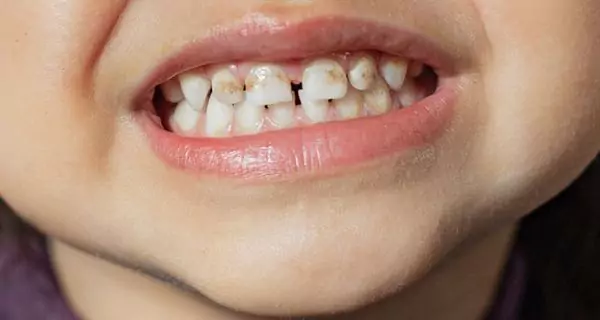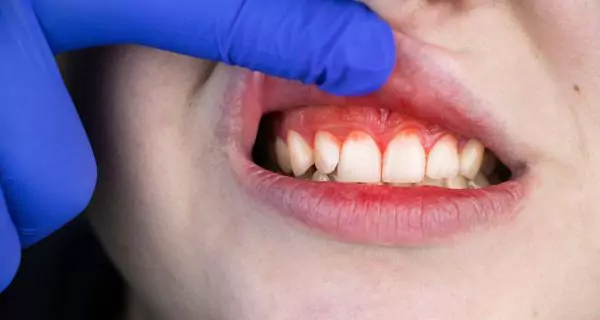Last Updated on: 19th September 2025, 12:29 pm
The effects of malnutrition go beyond the body: weakening teeth, gums, and oral tissues. When the diet does not give enough vitamins, minerals, and proteins, teeth become weak, gums get inflamed, saliva decreases, and healing after dental treatments takes longer. Eating a balanced diet and using supplements when needed can protect oral health.
Malnutrition is more common than many people think. It is not only about hunger or eating too little in poor countries; It also happens when there is a lack of nutrients in your diet.
According to the World Health Organization (WHO), over 820 million people worldwide suffer from malnutrition. In the United States, the USDA says that 1 in 8 households face food insecurity, meaning they do not always have access to healthy foods.
Without nutrients like calcium, vitamin D, vitamin C, protein, and iron, the mouth cannot stay healthy. Teeth, gums, and even saliva are affected. Let’s see the main effects of malnutrition on the mouth.
What are the main effects of malnutrition on oral health?

Good oral health isn’t just about having excellent hygiene; While this is indeed one of the most important aspects, it also depends on vitamins, minerals, and proteins. When they are missing, clear problems appear. Let’s see them one by one.
How does malnutrition weaken tooth enamel?
Enamel is the hardest tissue in the body, but it needs calcium and vitamin D to stay strong. Without them:
- Cavities appear more often.
- Teeth feel sensitive to hot and cold.
- Cracks may form.
If the body cannot absorb calcium well due to low vitamin D, even the jawbone gets weaker.
Why does malnutrition cause dry mouth?
Saliva is nature’s way of protecting the mouth. It washes food away and balances acids. But when the body lacks nutrients or hydration:
- The mouth feels dry.
- Bad breath appears.
- Bacteria grow faster.
- Gum disease and cavities become more likely.
A dry mouth is really uncomfortable and leaves the teeth unprotected.
How does malnutrition slow down healing in the mouth?
Healing requires protein, vitamin A, vitamin C, and zinc. Without them:
- Pain lasts longer.
- Wounds get infected more easily.
- Surgery, implants, or extractions have a higher risk of complications.
Poor nutrition makes every dental treatment harder to recover from.
Can malnutrition cause gum disease?
Yes. Gums need collagen, protein, and vitamins to stay strong. Without them:
- Vitamin C deficiency makes gums swollen and likely to bleed (severe cases cause scurvy).
- Protein deficiency slows healing and raises infection risk.
- Less collagen weakens gum tissue.
This can lead to gingivitis and periodontitis, which are two major causes of tooth loss.
How does malnutrition affect the oral microbiota?
The mouth is home to many bacteria, called the oral microbiota. A healthy diet keeps them in balance. Poor nutrition disrupts this balance, causing:
- Growth of harmful bacteria.
- Red, swollen gums.
- More plaque buildup.
- Higher risk of infections.
When the diet is poor, bacteria in the mouth easily take over and cause disease.
Malnutrition damages every part of the mouth, from enamel to gums and even the bacteria that live there. But these effects of Malnutrition do not happen the same way in everyone. Some groups of people are more at risk than others.
Who has the highest risk of oral problems from malnutrition?
Malnutrition affects everyone, but some people are more vulnerable than others.
Age, health conditions, and even access to food can make the mouth weaker against disease.
How does malnutrition affect children’s teeth?
For children, nutrition is key to growth and development. Without enough vitamins and minerals:
- Teeth erupt later than normal.
- Enamel forms thin and weak (enamel hypoplasia).
- Jawbones are fragile and less dense.
Malnutrition in early years leads to more cavities, more dental visits, and even problems with speech and self-confidence.
Why are pregnant women at higher risk?
During pregnancy, nutrients must support both the mother and the baby. If the diet is poor:
- Gums become swollen and bleed more easily.
- The risk of cavities rises due to hormone changes and frequent snacking.
- The baby’s teeth and bones may not develop properly.
Good nutrition in this stage is critical for the oral health of two lives, not just one.
What problems do older adults face with malnutrition?
As people age, chewing difficulties, reduced appetite, and weaker absorption of nutrients become common. This can cause:
- Bone loss in the jaw.
- Loose teeth or tooth loss.
- Dry mouth from medications or a lack of saliva.
- Slow recovery from dental treatments.
Older adults with dentures may also develop sores and infections when their diet lacks essential nutrients.
How does malnutrition affect people with chronic diseases?
Chronic conditions like diabetes, cancer, kidney disease, or digestive problems interfere with how the body uses nutrients. As a result:
- Gums stay inflamed.
- Healing after dental work takes longer.
- Infections appear more easily.
- Teeth wear down faster.
These health challenges make proper nutrition even more important to protect the mouth.
Why are food-insecure families more vulnerable?
Families who cannot access healthy foods often depend on cheap, processed meals high in sugar and low in protein. This leads to:
- Deficiency of calcium, vitamin D, and proteins.
- Higher rates of cavities in children.
- Greater risk of gum disease in adults.
Food insecurity creates a cycle where a poor diet harms oral health, and oral problems make eating well even harder.
Children, pregnant women, older adults, people with chronic illnesses, and food-insecure families face the strongest impact of malnutrition on their oral health.
Knowing these risks is the first step; the next is learning how prevention and good nutrition can protect the mouth.
How can you prevent the effects of malnutrition on teeth and gums?
Most oral problems caused by malnutrition can be prevented with simple but consistent habits.
It’s important to combine a balanced diet, daily oral hygiene, and professional care.
Why is a balanced diet important?
Teeth, gums, and jawbones depend on nutrients to stay strong and resistant. A healthy diet should include:
- Lean proteins: chicken, fish, eggs, beans.
- Fresh fruits and vegetables: rich in vitamins A and C.
- Whole grains: for lasting energy and minerals.
- Dairy or fortified alternatives: calcium and vitamin D.
- Nuts and seeds: zinc and healthy fats.
Too much sugar and processed food weaken the mouth, increasing cavities while cutting out essential nutrients.
What role does hydration play?
Water is the best drink for oral health. Staying well hydrated:
- Boosts saliva production, the body’s natural defense.
- Washes away sugars and food particles.
- Prevents dry mouth, bad breath, and decay.
Choosing water over sodas or juices is one of the simplest but strongest habits for a healthier mouth.
When are nutritional supplements useful?
Sometimes food and water are not enough, especially at certain life stages. Doctors may recommend:
- Vitamin D and calcium: to strengthen teeth and bones in children, pregnant women, or older adults.
- Vitamin C: to keep gums firm and healthy.
- Zinc and iron: to support healing and fight infections.
Supplements should only be taken with professional guidance, never on your own.
How does oral hygiene help in prevention?
Good nutrition must be supported by daily hygiene to stop bacteria and plaque from damaging the mouth. Essential steps include:
- Brushing at least twice a day with fluoride toothpaste.
- Flossing or using interdental brushes.
- Rinse with mouthwash if advised by a dentist.
- Scheduling regular dental checkups.
Consistent oral care makes the difference between prevention and a long and expensive treatment.
Nutrition and hygiene go hand in hand. Eating well, drinking water, and caring for your mouth every day are the strongest tools to prevent cavities, gum disease, and oral infections.
Together, these habits are the foundation for a healthy smile at every stage of life.
What products can support nutrition and oral health?
Food should always be the first source of nutrients, but some products can complement oral care:
- Garden of Life Vitamin Code Multivitamin: complete vitamin support.
- Nature Made Calcium + Vitamin D3: for stronger teeth and bones.
- TheraBreath Healthy Gums Oral Rinse: gentle rinse to support gum health.
- Biocalcium toothpaste: helps repair enamel with calcium.
- Orgain Organic Protein Powder: an easy boost of protein.
Always consult a doctor or dentist before using supplements or specialized products.
What does malnutrition teach us about oral care?
The effects of malnutrition show us that oral health is much more than brushing and flossing. Teeth, gums, and jawbones need nutrients every day to stay strong and resistant.
Without them, teeth get weak, gums get sick, and the mouth takes longer to heal.
Bad nutrition makes problems come faster. Good nutrition, daily cleaning, and dentist visits make the mouth stronger and healthier for life.
Frequently Asked Questions
Do I always need supplements?
No. Food should be the main source of nutrients. But in some cases, like children, pregnant women, or older adults, the doctor may suggest supplements. Always ask before taking them.
Does malnutrition only happen to people who don’t have enough food?
Can losing weight too fast affect oral health?
Do athletes need more nutrients for oral health?
Can malnutrition change the way the mouth feels?
Voice and Search (Q&A)
Can bad nutrition cause cavities?
Yes. Without calcium, vitamin D, and protein, teeth get weak and cavities form more easily.
What foods make teeth stronger?
Milk, cheese, yogurt, fish, eggs, beans, fruits, and leafy greens help teeth and gums stay strong.
Does sugar cause malnutrition?
Not directly, but eating too much sugar replaces healthy foods and leads to weak teeth and more cavities.
Share
Referencias
- Azzolino, D., Passarelli, P. C., De Angelis, P., Piccirillo, G. B., D’Addona, A., & Cesari, M. (2019). Poor oral health as a determinant of malnutrition and sarcopenia. Nutrients, 11(12), 2898. https://www.mdpi.com/2072-6643/11/12/2898
- Hollaar, V., De Van Der Schueren, M., Haverkort, E., Everaars, B., Borkent, J., Jerković‐Ćosić, K., Van Hout, H., Everink, I., & Naumann, E. (2024). Associations between problems in oral health, oral function and malnutrition in older people: results from three databases. International Journal of Dental Hygiene. https://onlinelibrary.wiley.com/doi/10.1111/idh.12886
- Krans, B. (2023, November 20). Balanced diet. Healthline. https://www.healthline.com/health/balanced-diet
- Vieira, K. A., Rosa-Júnior, L. S., Souza, M. a. V., Santos, N. B., Florêncio, T. M. M. T., & Bussadori, S. K. (2020). Chronic malnutrition and oral health status in children aged 1 to 5 years. Medicine, 99(18), e19595. https://doi.org/10.1097/md.0000000000019595
- World Health Organization: WHO. (2024, March 1). Malnutrition. https://www.who.int/es/news-room/fact-sheets/detail/malnutrition
-
Dr. Yeidy Carolina Mesa [Author]
DDS Yeidy Carolina Mesa Passionate Dentist | Advocate for Accessible Oral Health Education Graduating from Universidad CES in 2022, I am a dedicated general dentist with a lifelong passion for helping others and making a meaningful impact in the world. My journey into dentistry began at the age of 7, inspired by my own experience with braces and overcoming a fear of the dentist. This personal journey shaped my mission to help patients conquer their own dental anxieties and embrace a healthier,...
View all posts
-
Nayibe Cubillos M. [Medical Reviewer]
Pharmaceutical Chemestry |Pharmaceutical Process Management | Pharmaceutical Care | Pharmaceutical Services Audit | Pharmaceutical Services Process Consulting | Content Project Manager | SEO Knowledge | Content Writer | Leadership | Scrum Master
View all posts
A healthcare writer with a solid background in pharmaceutical chemistry and a thorough understanding of Colombian regulatory processes and comprehensive sector management, she has significant experience coordinating and leading multidisciplina...






















